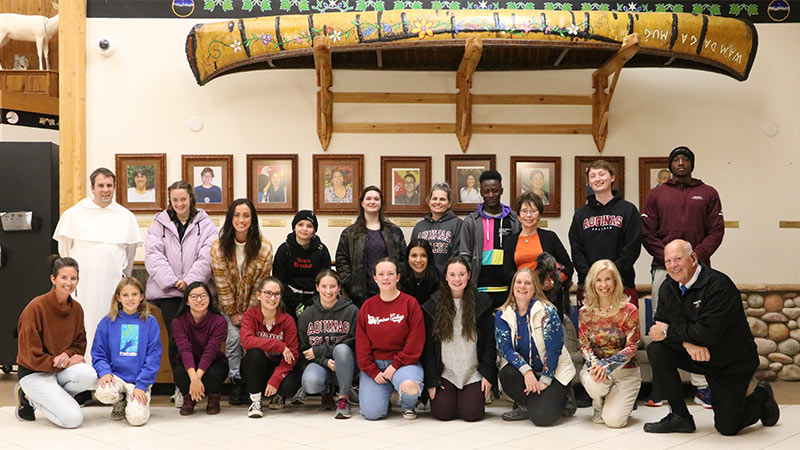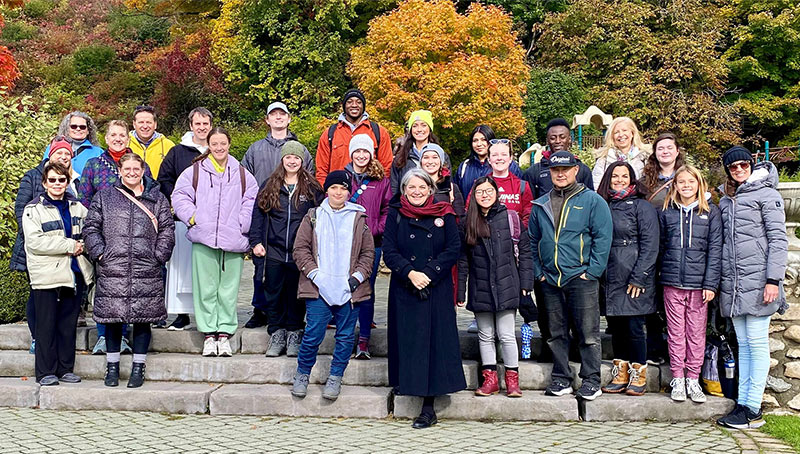When it comes to indigenous histories, there’s a significant knowledge gap in many students’ educations. Ask yourself how many federally recognized tribes in your state you can name right now. If you’re in Michigan, the answer is twelve.
“People need to know there are indigenous people here in Michigan and here at Aquinas College,” said Dr. Linda Keway, a professor at Aquinas and a member of the Little Traverse Bay Band of Odawa Indians.
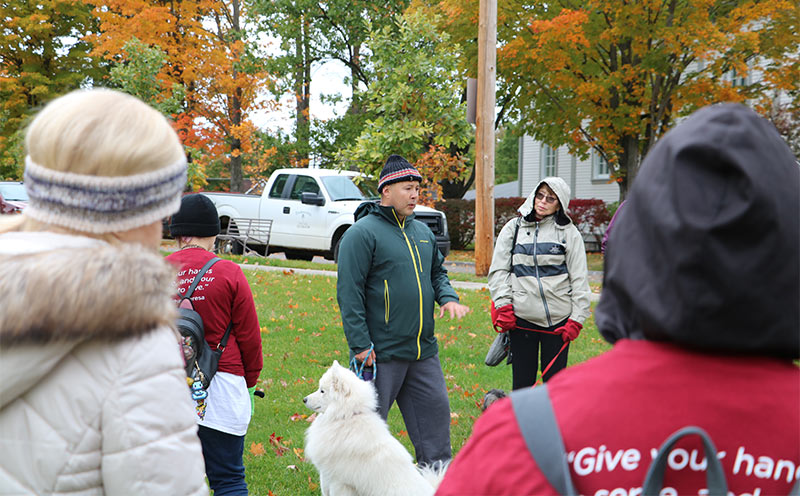 In 2020, Dr. Keway, Advantage Center Internship Director Brigid Avery, and Advantage
Center Executive Director Dr. Dana Hebreard began planning an immersive learning opportunity
that would take students up north to cities like Petoskey, Charlevoix and Mackinac
Island to experience the history and culture of indigenous people in Michigan.
In 2020, Dr. Keway, Advantage Center Internship Director Brigid Avery, and Advantage
Center Executive Director Dr. Dana Hebreard began planning an immersive learning opportunity
that would take students up north to cities like Petoskey, Charlevoix and Mackinac
Island to experience the history and culture of indigenous people in Michigan.
Keway, Hebreard, Avery and Fr. Bob Keller gathered a group of 17 interested Aquinas students and with Eric Hemenway, Director of Repatriation and Archives for Little Traverse Bay Band of Odawa Indians as their guide, they embarked on a journey to hear Native histories and cultivate awareness of the systemic issues facing indigenous people today.
The trip was packed with experiences. Students stayed at the Odawa Hotel in Petoskey. They went to Harbor Springs where they learned about the delegation of Odawa men who in 1835 took an 800-mile canoe trip from there to Washington, D.C. to advocate for their right to remain on their land. They visited Mackinac Island, learning about its sacred history, which is often overlooked in favor of a more commercialized experience of fudge and horse-drawn carriages. They admired the traditional arts of the Little Traverse Bay Bands of Odawa Indians at Crooked Tree Arts Gallery. They also reflected at the site where the Holy Childhood of Jesus Catholic Boarding School once stood.
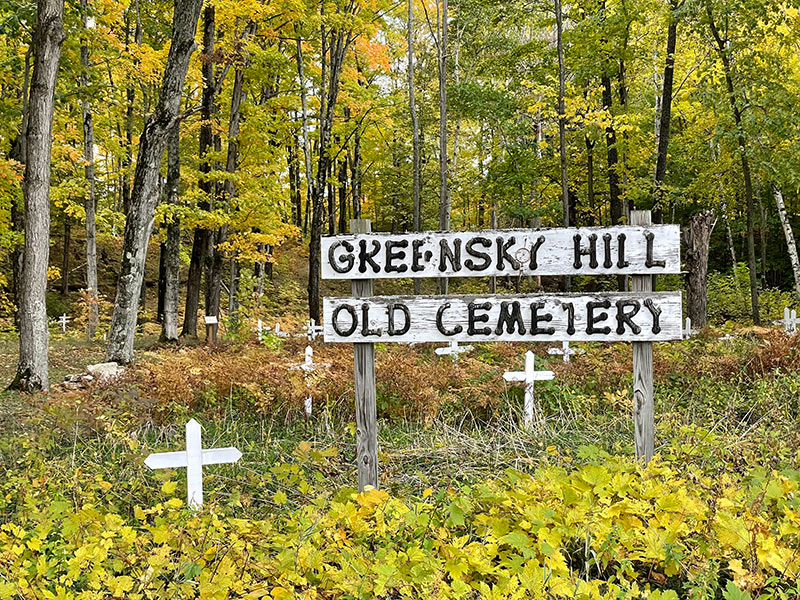
The trip was transformational for the students who attended. So much so that they asked Dr. Keway to extend it into a class, which she did the following year. The course allowed students to dive deeper into the histories of the places they would visit before the trip in October. Noteworthy speakers were also frequently brought into the classroom.
“There’s so much more Michigan history than we’re ever taught about,” said Adeline Shaw, who took the course last year. “There’s a rich Native culture and history here. Our history isn’t younger than Europe’s. We’re just not acknowledging it.”
Shaw’s final writing assignment for the course focused on how this course could serve as a model for healing between indigenous boarding school survivors and Catholic colleges, which will appear in the next edition of Magna Verba, Aquinas’s published collection of academic writing. She also wrote a poem that will appear in Sampler, another Aquinas publication focusing on creative writing and visual art. In the Fall, she’ll be pursuing a Master’s degree in Social Anthropology at the University of St Andrews in Scotland.
Grahm Staib, who is currently a senior at Aquinas enjoyed the interdisciplinary nature of the class. While learning from sociology majors like Shaw, Staib was also able to integrate his own experience as a political science major into the course, organizing a letter-writing campaign with his classmates to advocate for the passage of Senate Bill 0876, which would have required the existence of Indian Boarding Schools in Michigan to be included in public school history curriculum. While the bill was not passed into law, Staib hopes to see the bill revived, and plans on continuing that advocacy work.
Staib shares his experience widely with fellow students at Aquinas, encouraging them to sign up: “Going to places like Petoskey, Harbor Springs, and Mackinac Island that you go to as tourists and seeing it from another perspective is important, especially for people from Michigan.”
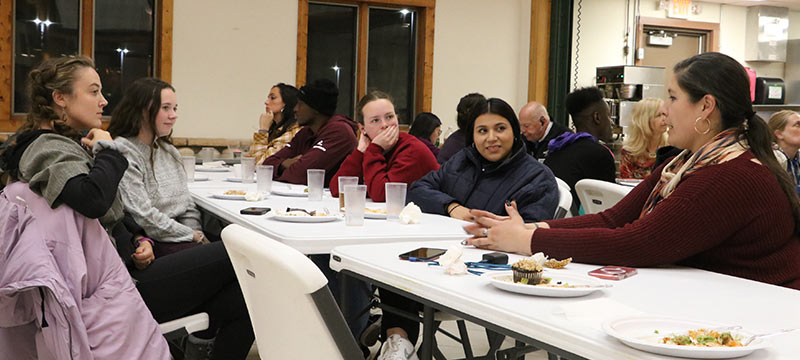 Sophia Lugtigheid, another student who took the course last year agrees: “I really
enjoy place-based learning, so I felt like I took away so much that I am going to
continue to share with people and get them interested in the class next year. I think
everyone should take this class and trip because of how eye-opening it was.”
Sophia Lugtigheid, another student who took the course last year agrees: “I really
enjoy place-based learning, so I felt like I took away so much that I am going to
continue to share with people and get them interested in the class next year. I think
everyone should take this class and trip because of how eye-opening it was.”
The 2023 trip will include many of the stops and experiences from previous trips. For the first time this year, however, students will be welcomed by the Little Traverse Bay Band of Odawa Indians with a shared traditional meal cooked by the tribe.
With advising for the Fall 2023 semester beginning on March 20th, students will soon be able to sign up for SOC 325: Anishinaabe History and Culture, which ensures them a spot on the trip up north, as it’s a required piece of the course. If SOC 325 doesn’t fit into their schedule, students will still be able to sign up to attend the trip.
